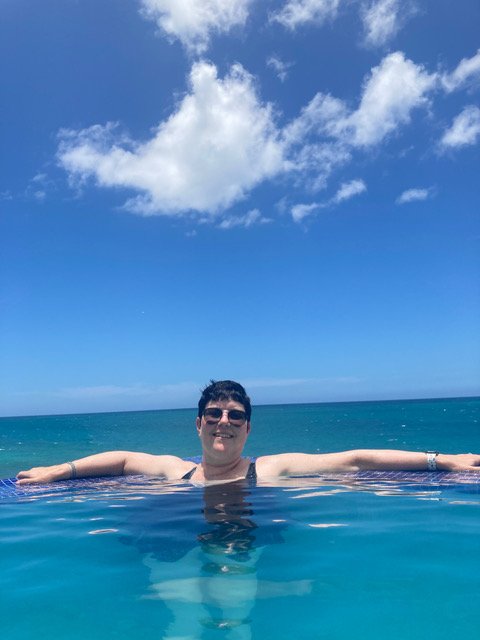"Letting Go" by Sandy Sufian
I have now been involved with Singspire for several sessions and my voice lessons have taught me not only how to breathe but also about the way I hold my stress, hang onto control, and am a quintessential “heady” person.
The stress I hold in my body is immense; far greater than I even acknowledged. Sure, we all experience majorbodily stress by virtue of having CF; inflammation, pain, and social prejudice don’t exactly lead to relaxation. But through Singspire, I have paid attention to parts of my body that I hadn’t attended to before. During my voice lessons, my instructor and I have been doing lymphatic massage exercises for my jaw to get me to let go of the massive amount of tension I hold there. I also realized the extent to which I carry significant amount of stress in my neck and shoulders, such that those muscles feel like concrete. We do other exercises that force me to open my mouth long while voicing “AHHHHH” to relax. These exercises are meant to make me aware of the need to open my mouth longwise while singing certain vowels. Miraculously, it helps with projection and with proper breath too.
Still, I often forget to open my mouth this way, which ultimately reflects my tendency for self-control. I get too focused on singing the notes just right, and on remembering words. As someone who studied piano and music composition in my youth, I frequently hone in on the chords, the song’s time signature, its key, and the counting of quarter and eighth notes. I revert to controlling the process, not letting go and not letting things just happen, even if it means totally missing the mark. This process has tested my patience with myself and has highlighted my perfectionism to the extreme. Over time, I have slowly become cognizant of allowing myself to make mistakes, sound bad, or even sound good. My instructor makes the sessions so fun and encouraging, that the contrast of how I enter and leave the sessions is stark.
Relatedly, my instructor has taught me that in singing, one must lead with emotion, not intellect. You are telling a story, she says, and so have to embody the emotional parts of that story in your voice and body. Although it seems obvious, this was somewhat revelatory to me because I have come, as an adult, to intellectualize most parts of my life. As a professor, I spend all of my days reading, writing, teaching, grading, revising, and conceptualizing. These are the values of academics. Singing has highlighted how important emotion is and how intellect and emotion can intersect and in fact buttress the other. Its not that I have zero emotion in my life: I have a family, friends and a pet who I care for immensely, have fun, smile, get sad, etc. But singing taps into and harnesses something different. It reaches into one’s depths, forces the singer to express someone else’s story while emphasizes the parts that resonate to them.
Singspire has really helped me understand myself better, made me more attuned to my body and brain, and has given me the opportunity to just have pure fun and be silly. Laughing is a huge part of my sessions. At the end of continuously busy workweeks, I have found I really need that carved out time to switch gears, try to relax, and leave behind– even if only for a little– life’s pressures to make music.

